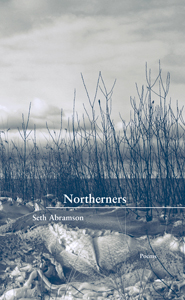Book Review
 The words “north” and “northern” connote a number of images and ideas: cold, isolation, snow, silence. In Northerners, his second collection and winner of the 2010 Green Rose Prize in Poetry from Western Michigan University, Seth Abramson evokes and amalgamates these images while simultaneously composing poems that glow with immediate warmth, poems whose emotional language often complicates and occasionally contradicts outright the private worlds it creates. These poems, alternately expansive and deeply personal, are of crystalline beauty and complexity.
The words “north” and “northern” connote a number of images and ideas: cold, isolation, snow, silence. In Northerners, his second collection and winner of the 2010 Green Rose Prize in Poetry from Western Michigan University, Seth Abramson evokes and amalgamates these images while simultaneously composing poems that glow with immediate warmth, poems whose emotional language often complicates and occasionally contradicts outright the private worlds it creates. These poems, alternately expansive and deeply personal, are of crystalline beauty and complexity.
Abramson’s work is not in any sense inorganic, however. Muscular and sinuous, it wrestles with language and engenders genuine emotion through the careful use of the visceral image and the particular. This is, in a sense, reminiscent of Eliot’s “objective correlative,” the evocation of a response in the reader via a sequence of salient objects and images. The vehicle of language is often more important than the meaning it aims to convey; to borrow from Northrop Frye, on the spectrum from incantation to logical meaning, Abramson often leans toward the former to communicate emotional states: “their two faces were almost one / he said, I am your horse. I am / your horse. I am your horse” (“A Man and Boy or Two Boys or a Horseman”). This kind of repetition—invocation, really—lends a ritualistic, surreal quality to a poetics of often aching verisimilitude.
Although similar in many ways to another New Hampshire poet, Abramson’s is not the poetry of Robert Frost—at least, not the poetry of the pre- or non-modernist Frost, comprising of frostbitten fields and abandoned farmhouses. While Northerners very much exemplifies a poetics of place, it is not confined to the rural landscapes of New England or the lyric hush of the pastoral. The poems in this collection often exceed and subvert the reader’s expectations of their emotional and physical locales: “and backwards go / the men into the garden” (“Ruin”); “and here is the city / with its Martians in leather and excoriated thunderbolt- / boas” (“Provincetown Fourth”); “When you are a city / its center is emptied of people, and we meet there / where the newspapers are piling in drifts” (“What Sex Means to Me”). We return to Eden, but do so backwards; burning oil drums, satellites, and subway lines coexist with country coroners, chicken farms, and amaranths. These concrete images engender powerful and nuanced emotional reactions, and despite—or perhaps owing to—their wide range and disparate circumstances, the poems employing them all struggle with and against the same human universals: loneliness, the desire for love, and the mystery of death.
Northerners is neither an overt nor traditionally religious text, but the influence of the Judeo-Christian tradition makes subtle appearances throughout. Men are “herding,” descending “backwards… into the garden” (“Ruin”); “he attracts the devil he reflects” and “walks the same tune / as his religion, and the god he calls everywhere / like a dog by whistle / sits down with him” (“Duties of Waste Also”); “The Fall” raises the question of “how many miracles / makes a saint”; the poem “The Last Inch” ends with the supplication, “Please God / let us be good to one another.” While not devout in the usual sense nor truly irreverent, these poems act as an extended meditation on belief and its relationship to how we treat and interact with one another; they act as a set of alternate hymns for the twenty-first century. One cannot help but be moved by the primacy, the fundamental authenticity, of Abramson’s language and subjects.
Ultimately, Seth Abramson’s second collection offers a compound and compounding vision of contemporary American life, mapping physical and emotional landscapes that range from the poorest neighborhoods of New England cities to the open plains of Nebraska. Northerners drives at the heart of subjective individual experience, inducing rather than describing multifaceted and deeply moving emotional reactions by illustrating the human exchanges and chance encounters that comprise our lives. It is the battle between chance and the antithetical notion of fate that underlies so many of the emotional tensions in these poems, tensions rendered simultaneously beautiful and unsettling by the poet’s incantatory language. “Chance is a hammer,” Abramson writes in “Rough Air,” “get me my hammer.” The desire to employ chance as a tool—to effectively reconcile chance and fate—is not only a fundamental concern in this collection, but a defining feature of the human race. Seth Abramson’s ability to identify and connote, rather than denote, these elemental aspects and desires of the human psyche is among his many strengths as a poet, and it bodes well for his continued rise as a major American voice.
About the Reviewer
Eric Weinstein’s poems have appeared or are forthcoming in the Best New Poets 2009 anthology, Denver Quarterly, Ploughshares, the Southern Review, and elsewhere. He lives in New York City.